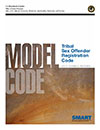There are currently 135 tribal jurisdictions that have substantially implemented SORNA's requirements. Substantial Implementation Reports for each of these tribal jurisdictions are available on the SORNA page.
Substantial Implementation Reports: Indian Country
For more information about those Indian nation, tribe, and pueblo registration and notification systems that have been found to have substantially implemented SORNA, please see the SMART Office reviews.
Adam Walsh Act
Pursuant to §127 of the Adam Walsh Act all federally recognized Indian tribes are entitled to elect whether to carry out the requirements of this section or delegate the functions to the state(s) in which the tribal land is located.
Tribal Resolutions Pursuant to the Adam Walsh Child Protection and Safety Act of 2006 lists all 562 federally recognized tribes, indicates their eligibility to elect to fulfill sex offender registry functions under the Walsh Act, and indicates which tribes have made such an election.
The Sex Offender Registration and Notification Act (SORNA):
A guide on SORNA implementation in Indian Country
The SMART Office developed this guide to assist tribal jurisdictions in implementing or continuing implementation of SORNA. It provides a comprehensive overview of SORNA’s requirements and serves as a job aid for sex offender registration personnel in Indian Country. It includes step-by-step direction on how to complete certain tasks and links to helpful templates and guidance documents.

Model Tribal Sex Offender Registration Code
The Model Tribal Sex Offender Registration Code 2017 Revised Version is now available. The model code assists tribes in developing or updating existing sex offender registration legislation to meet SORNA requirements. The 2017 revision includes updates, drafting tips and a user-friendly layout.
Download PDF | Printer-friendly version

Tribal Training & Technical Assistance
The SMART Office can provide training and technical assistance to tribes, nations and pueblos working toward substantial implementation. Typical methods of assistance have been arranged through onsite assistance, conference calls, webinars, peer-to-peer support and training and community outreach events. If your tribal jurisdiction is interested in receiving assistance, please email [email protected] or call 202-514-4689.
SORNA Implementation
Tribal Access Program
The SMART Office is pleased to announce that the U.S. Department of Justice (DOJ) has established the Tribal Access Program (TAP) to provide tribal jurisdictions access to federal crime information databases. This program is heavily informed and driven by tribes, pueblos, and nations working to implement SORNA and by the SMART Office's commitment to resolving the information sharing issues brought to our attention by our tribal jurisdictions. The SMART Office worked with DOJ's Justice Management Division and the Office of Tribal Justice to find a solution for all tribes. Visit the Tribal Access Program page for more information.


